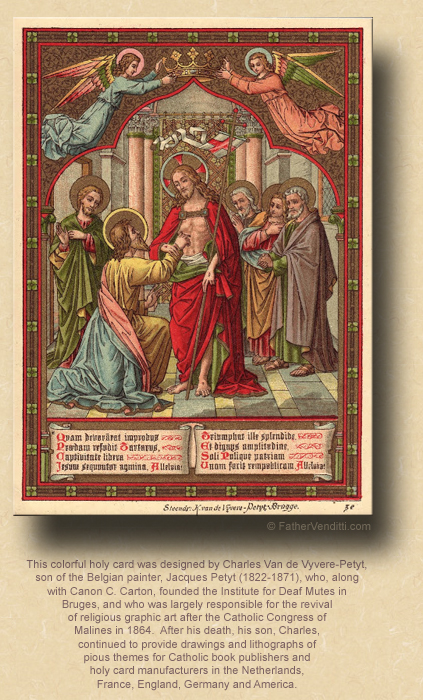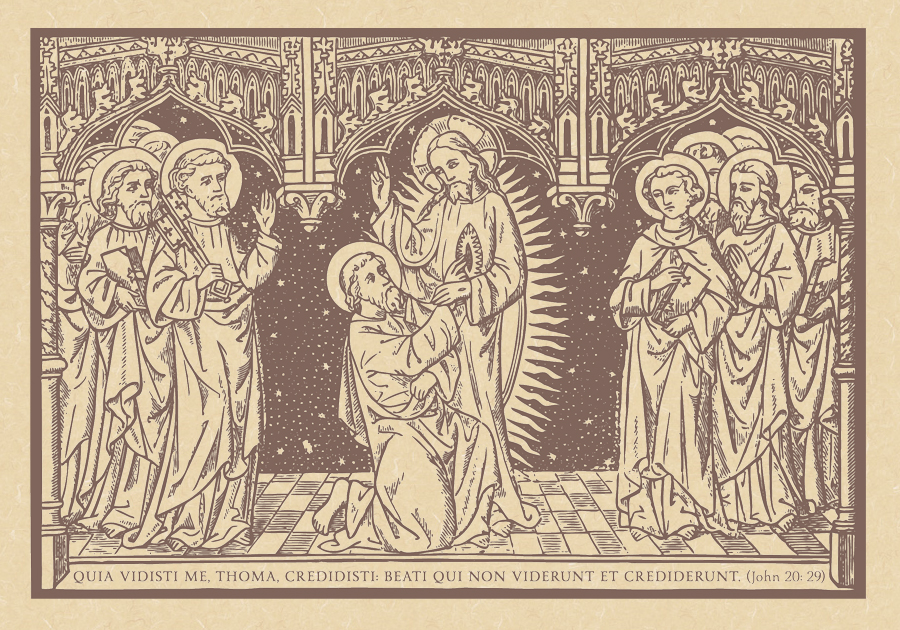Guilt Is Good.
The Second Sunday of Easter; or, the Sunday of Divine Mercy.
Lessons from the tertiary dominica,* according to the ordinary form of the Roman Rite:
• Acts 5: 12-16.
• Psalm 118: 2-4, 13-15, 22-24.
• Revelation 1: 9-13, 17-19.
• John 20: 19-31.
The Octave Day of Easter; Low Sunday; the Sunday in Albis; or, Quasimodo Sunday.
Lessons from the dominica, according to the extraordinary form of the Roman Rite:
• I John 5: 4-10.
• [The Gradual Psalm is omitted.]
• John 20: 19-31.
Thomas Sunday.**
Lessons from the pentecostarion, according to the Ruthenian recension of the Byzantine Rite:
• Acts 5: 12-20.
• John 20: 19-31.
FatherVenditti.com
|
 7:58 AM 4/3/2016 — The Octave Day of Easter is one of those days that has suffered the indignity of everyone wanting to call it something different to suit themselves. When Pope Saint John Paul II decided to impose on the whole Church his favorite Polish devotion, he did so on this day and called it “Divine Mercy Sunday,” but it's had other names. Some of you may remember growing up calling it “Low Sunday,” and it's still sometimes called this in English speaking countries; it means nothing more than a contrast with Easter which was sometimes called “High Sunday” because it is the “Sunday of Sundays.” If you have an old pre-Vatican II missal at home, you may see it listed as the “Sunday in Ablis,” in albis being Latin for “without white,” because it was on this day that the neophytes baptized at Easter would set aside their white garments. And if you have a really old missal at home, you might see it listed as “Quasimodo Sunday,” taken from the first words of the Introit which is still the Entrance Antiphon for today, taken from Saint Peter's First Epistle: Quasi modo géniti infántes, rationábile, sine dolo lac concupíscite, ut in eo crescátis in salútem, allelúia; “Like newborn infants, you must long for the pure, spiritual milk, that in Him you may grow to salvation, alleluia" (cf. 1 Peter 2: 2). And for those of you who have never read Victor Hugo's Notre Dame, the character of the hunchback is so named because, in the opening chapter, he is found as an infant on the steps of the Cathedral on Quasimodo Sunday. And, yes, all of this will be on the exam. 7:58 AM 4/3/2016 — The Octave Day of Easter is one of those days that has suffered the indignity of everyone wanting to call it something different to suit themselves. When Pope Saint John Paul II decided to impose on the whole Church his favorite Polish devotion, he did so on this day and called it “Divine Mercy Sunday,” but it's had other names. Some of you may remember growing up calling it “Low Sunday,” and it's still sometimes called this in English speaking countries; it means nothing more than a contrast with Easter which was sometimes called “High Sunday” because it is the “Sunday of Sundays.” If you have an old pre-Vatican II missal at home, you may see it listed as the “Sunday in Ablis,” in albis being Latin for “without white,” because it was on this day that the neophytes baptized at Easter would set aside their white garments. And if you have a really old missal at home, you might see it listed as “Quasimodo Sunday,” taken from the first words of the Introit which is still the Entrance Antiphon for today, taken from Saint Peter's First Epistle: Quasi modo géniti infántes, rationábile, sine dolo lac concupíscite, ut in eo crescátis in salútem, allelúia; “Like newborn infants, you must long for the pure, spiritual milk, that in Him you may grow to salvation, alleluia" (cf. 1 Peter 2: 2). And for those of you who have never read Victor Hugo's Notre Dame, the character of the hunchback is so named because, in the opening chapter, he is found as an infant on the steps of the Cathedral on Quasimodo Sunday. And, yes, all of this will be on the exam.
The name that makes the most sense is the one given to it by the Byzantine Churches, who simply call it “Thomas Sunday” for the most obvious of reasons, and it is that Blessed Apostle who should be our focus today.
It is important to notice that our Lord does not blame Thomas for requiring proof of the Resurrection; after all, the other apostles would have been no less incredulous, since the only reason they believed it was because they had seen our Lord. What’s interesting is that our Lord does not discourage the notion that faith needs to be based on some sort of credible grounds that make sense. When He appears to the Apostles the second time, and Thomas is finally with them, while He does make the statement, “Blessed are those who have not seen and have believed” (John 20: 29 NABRE), He still invites Thomas to touch his holy wounds. He’s willing to surrender the principle that faith should be blind. His statement presents the ideal, but the ideal is tempered by reality and an understanding of fallen human nature.
Following this familiar event, Thomas disappears from the Gospel; thus, we know nothing for certain about his post-Resurrection activities. Nevertheless, according to ancient traditions, Saint Thomas reportedly landed at Kodungalloor in the Year of Our Lord 52, and founded seven Churches in southern India in what is now known as the province of Kerala. His decision to go there is not as extraneous as it sounds, given that southern India had long before been colonized by the Jews; and, the seven Churches that Thomas established in India correspond to the seven original Jewish colonies there. Of course, most of us remember the Blessed Apostle Thomas solely for the event described in today's Gospel lesson—his doubting our Lord's resurrection—but conveniently forget the fact that, as a missionary, he carried the Gospel farther than any other Apostle, and established vibrant Churches in the farthest outposts of the known world that remain to this day.  And whenever we hear comedians make jokes about having grown up with what they call “Catholic guilt,” or are told that guilt is some kind of negative thing that we must purge from our psyche in order to be healthy, it's wise to remember the example of the Blessed Apostle Thomas, and realize that the guilt that Thomas felt for having doubted our Lord's resurrection is probably what motivated him to be the most effective missionary of Apostolic times. And whenever we hear comedians make jokes about having grown up with what they call “Catholic guilt,” or are told that guilt is some kind of negative thing that we must purge from our psyche in order to be healthy, it's wise to remember the example of the Blessed Apostle Thomas, and realize that the guilt that Thomas felt for having doubted our Lord's resurrection is probably what motivated him to be the most effective missionary of Apostolic times.
Without a doubt, the most joyful periods of my long years as the pastor of a number of parishes were those occasions when I received converts into the Church at Easter time. And in the Byzantine Catholic Church in which I served as a pastor there is no such thing as the RCIA; convert instruction is done the old fashioned way, one on one. And there are two ways to go about instructing converts: you can take a didactic approach and just throw the truths of the faith out there, declare them revealed by God—which they are—and simply demand that the convert blindly accept them without question; but, this is not what we do for the simple reason that this isn’t what our Lord did. Yes, He did say, “Blessed are they who have not seen, yet believe,” but he also spoke about the seed that falls into rocky ground, which sprouts up very quickly with enthusiasm, but is blown away at the first wind of trouble because it's not planted in good enough soil and its roots are not deep enough (cf. Matt. 13: 20-21).
When our Lord shows Thomas His wounds, He’s not compromising the truth, He’s just planting the seed in better soil; and, given the fact that Thomas, as a missionary, carried the Gospel farther than any other apostle, I don’t think any of us can find reason to quarrel with the results. Man is a divine being, created by God with an immortal soul, but that soul has been tainted with sin. Our fallen nature compromises our divinity. Our faith should be blind, but the simple fact is that it isn’t. Blessed John Henry Newman, who was a convert himself and who spent a lot of time working with converts, used to sum it up this way: “A hundred questions do not equal one single doubt.” After all, a person who outright doubts the faith is looking for a way out; he’s looking for a way not to believe because he doesn’t want to sacrifice the things that the faith will require from him, because a doubt does not seek an answer; it seeks an escape. But a person who questions is looking for a way in, because a question seeks an answer; and, one cannot seek an answer sincerely without wanting to find it, and when he finds it, he conforms himself to it.
It is, therefore, to our benefit to take notice of the manner which our Lord chose to strengthen the faith of Thomas: He doesn't perform any miracle, He doesn't burst into the room with a blast of trumpets. Later, He would eat in the presence of His disciples to prove He was real, but He doesn’t even do that on this occasion. For the very first test of His Resurrection, our Lord simply shows Thomas the marks of His passion. That is significant. Our Blessed Lord's manner of dealing with Thomas' doubt is meant to caution us against any presentation of the Christian message which seeks to eliminate the Cross and the crucifixion, against anyone who would try to soften Christ so that he becomes a mild and likable teacher of social principles, those for whom the mystery of the Cross and it’s implications in their personal and practical lives are too harsh, those for whom the repentance, asceticism and sacrifice for which the Cross stands are simply unacceptable.
By showing His wounds to Thomas, Christ is warning us to reject the false “christs” that these deniers of the Cross set up for us. Like Thomas, we insist on looking at and touching the wounds of our Lord, because we know that a “christ” who does not carry the imprint of the nails is not authentic, and we shall reserve our adoration for the Crucified One alone. Only the Christ Who shows us that the road to heaven is the Way of the Cross is the One to Whom we shall say, “My Lord and my God.”

* The first three lessons (including the psalm) are variable with the current dominical cycle, while the Gospel lesson is always the same.
** In the Ruthenian recension, today begins "Thomas Week," the ferial days of which are designated as days of "Thomas Week" (e.g., "Monday of Thomas Week" or "Thomas Monday") rather than days of Pascha, though that is understood.
|

